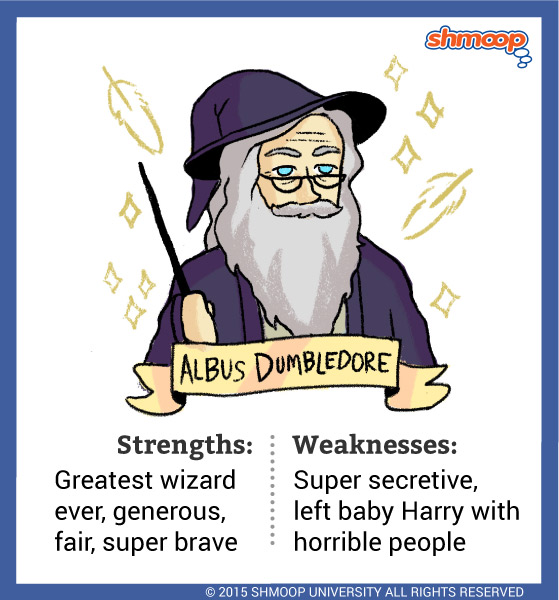Character Analysis

(Click the character infographic to download.)
Professor: Headmaster of Hogwarts
From Star Wars to The Lord of the Rings, every good fantasy series needs a mentor for the hero. There has to be the all-knowing guy (or gal!) who's going to show our young star the ropes of the world he's exploring. In Harry Potter, that guy is (obviously) Professor Dumbledore, Headmaster of Hogwarts School of Witchcraft and Wizardry. Dumbledore fits our classic, Gandalf-like image of the silver-bearded wise magician. And he's a terrific grandfather figure to Harry, to boot.
Other Sides to Dumbledore
By Goblet of Fire, that mentor relationship is starting to change. Harry begins to see a new side of Dumbledore. Part of that new side is furious anger:
The look upon Dumbledore's face as he stared down at the unconscious form of Mad-Eye Moody was more terrible than Harry could have ever imagined [...] There was cold fury in every line of the ancient face; a sense of power radiated from Dumbledore as though he were giving off heat. (35.89)
After Harry meets resurrected Voldemort face-to-face, he must also confront the reality of Voldemort's equal on the side of Good – Dumbledore. Anyone with that kind of power is terrifying, even if they're decent individuals. Although Dumbledore has always been kindly and generous with Harry, we can't forget exactly how dangerous he is as a wizard.
The other part of Dumbledore that Harry begins to acknowledge is the frail, human side. Dumbledore has a phenomenal amount of knowledge, so he always seems to be at least two steps ahead of everybody else in these novels. Certainly, he appears to know more about Voldemort's resurrection ritual than anybody else does, with his "gleam" of "triumph" (36.29) as he listens to Harry's description of his meeting with Voldemort.
But, at the same time, Dumbledore is an old, old man (about 150, according to J.K. Rowling (source). Harry first begins to confront this fact in Goblet of Fire, when he observes: "[Dumbledore] looked as old and weary as Harry had ever seen him" (36.29).
Leaders at Odds
Dumbledore's great wisdom ends up pitting him against the increasingly foolish, power-hungry Minister of Magic, Cornelius Fudge. Fudge doesn't have the power to oppose a wizard as highly respected as Dumbledore (yet), but Fudge also leaves Hogwarts at the end of the novel threatening, "I don't know what you and your staff are playing at, Dumbledore, but I have heard enough [...] I will be in touch with you tomorrow [...] to discuss the running of this school" (36.154). So clearly, J.K. Rowling ends Goblet of Fire strongly foreshadowing future strain between Dumbledore and the Ministry of Magic. (Tune in to Harry Potter and the Order of the Phoenix for more!)
Still, if Dumbledore is going to get into a knock-down drag-out fight with Fudge, we know which side we're on, and not just because Dumbledore is Harry's bestie. J.K. Rowling is also completely on Dumbledore's side. In an interview, J.K. Rowling has concluded, "Dumbledore is the epitome of goodness" (source). In other words, Dumbledore is the model of all that is good in the Harry Potter world. And if J.K. Rowling is in Dumbledore's corner, so are we.